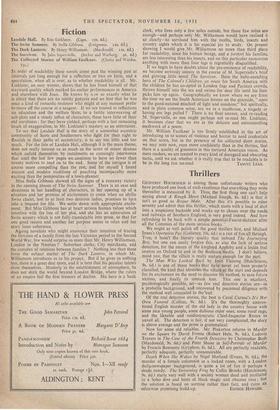Fiction Laxdalc Hall. By Eric Linklater. (Cape. 2S. 6c1.) IN
order of readability these novels come past the winning post at intervals just long enough for a reflection or two on form, and a speculation, when all is over, as to whether readability is all. Mr. Linklater, an easy winner, shows that he has freed himself of that wayward quality which marked his earlier performances in America and elsewhere with Juan. He knows by nJw so exactly what he is about that there are no untidy gestures and no hint that he was once a kind of romantic muleteer who might at any moment prefer to move off the course at a tangent. If we are treated to reflections on education and the welfare State, to a fertile interweaving of sub-plots and a steady influx of characters, these have little of their old unruliness ; for they have yielded, perhaps with a last remaining touch of exaggeration, to Mr. Linklater's mastery as an entertainer.
To say that Laxdale Hall is the story of a somewhat eccentric community of Scots and Southerners who fight for their right to flourish in ,their paths of eccentricity, is to say too little and too much. For the fate of Laxdale Hall, although it is the main theme, does not really interest us as much as the score of minor dramas which unfold themselves by instalments so cunningly interwoven that until the last few pages we continue to have no fewer than twenty motives to read on to the end. Some of the intrigue is of course more compelling than the rest, and for myself I found ancient and modern traditions of poaching incomparably more exciting than the pomposities of a town-planner.
Miss Stella Gibbons showed all the signs of a runaway victory in the opening phases of The Swiss Summer. There is an ease and directness in her handling of characters, in her opening up of a situation and her promise of excitements to come when an idyllic Swiss chalet, lent to at least two desirous ladies, promises to tyrn into a bequest for life. We settle down with appropriate excite- ment. But Miss Gibbons has at heart serious human values which interfere with the line of her plot, and she has an admiration of Swiss scenery which is not fully•translatable into prose, so that for one good reason and another her purpose seems to relax and her story loses coherence.
Aiiiong novelists who might announce their intention of tracing the fortunes of a family from the late Victorian period to the Second World War, few would surprise us more than Mr. Henry Williamson. London in the Nineties ? Suburban clerks, City merchants, and the complex of relations between families ? Nothing less than these form the subject matter of The Dark Lantern, in which Mr. Williamson introduces us to his project. But if he gives us nothing less, there is a great deal more, and it is here that his peculiar talents show themselves. Masterly in the establishment of atmosphere, he does not shirk the world beyond London Bridge, where the rulers of an empire feel the first tremors of decline. His hero is a bank
clerk, who lives only a few miles outside, but those few miles are enough—and perhaps only Mr. Williamson would have realised it so clearly—to surround him with the moths, birds, insects and country sights which it is his especial joy to study. On present showing I would give Mr. Williamson no more than third place for readability, since his human beings, and a fortiori his families, are less interesting than his insects, and on this particular racecourse anything with more than four legs is regrettably disqualified.
If we begin to have doubts about the pre-eminence of readability, we become seriously uneasy in the course of M. Supervielle's brief and glowing little novel The Survivor. Here the baby-snatching hero of The Colonel's Children, en route for South America with the children he has co-opted in London fogs and Parisian crowds, throws himself into the sea and swims for dear life until his liner picks him up again. Geographically we know where we are from the time we see the South American houses on the quayside:" open to the good-natured mischief of light and sunshine," but spiritually, and in plain common sense, are we in a madhouse, _a tragedy or having our legs pulled ? There is no final answer, and re-reading M. Supervielle, as one might perhaps not re-read Mr. Linklater, it becomes clear that we are in the delicate and entvammelling meshwork of a poem.
Mr. William Faulkner is too firmly established in the art of introducing us to scenes of violence and horror to need Credentials on that score, but in the presence of his collected short stories, we may note now, ev,en more confidently than in the thirties, that there is a quality of greatness in this tortured American vision. As mere readers, we are treated to every kind of disregard and obscuring tactic, until we ask whether it is really true that to be readable is to
be in the long run un-read. TANGYE LEAN.














































































 Previous page
Previous page